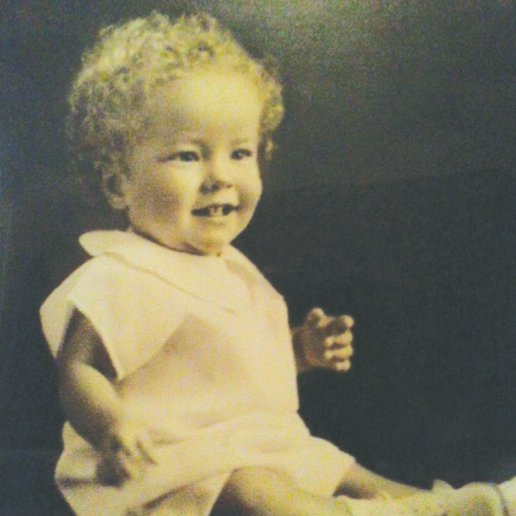 Dad was born during the Great Depression and New Deal years, between the Great Wars, and during a time of great change in this country. His parents held a deep pride for nation and service, and could trace their family history from colonial immigrants who first arrived in North America in the 1600’s and helped to build what would become the United States of America.
Dad was born during the Great Depression and New Deal years, between the Great Wars, and during a time of great change in this country. His parents held a deep pride for nation and service, and could trace their family history from colonial immigrants who first arrived in North America in the 1600’s and helped to build what would become the United States of America.
Dad’s childhood was shaped by this deep history and other events including his father’s service in World War I, and his mother’s strong character forged from the loss of most of her own family to the influenza epidemic of 1914, followed by several years as a school teacher.
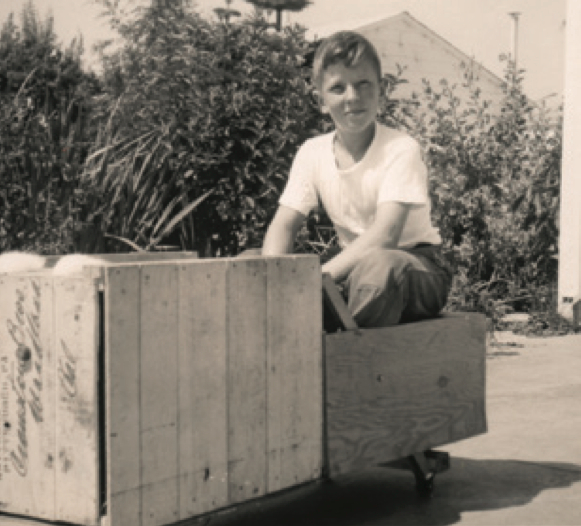 Growing up in the 1930s and 40s dad’s family, his parents, brother and sister, all lived the typical life in a booming America, a life with all the modern conveniences, deep community ties, and a strong sense of living ones life according to high standards of honor and integrity – except, of course, on liver Wednesdays. There’s no shame in feeding your liver dinner to the family dog, who always knew to hide under the table that night, where he’d lay waiting for the bountiful feast all the Krafft children would hand him secretly under the table every week.
Growing up in the 1930s and 40s dad’s family, his parents, brother and sister, all lived the typical life in a booming America, a life with all the modern conveniences, deep community ties, and a strong sense of living ones life according to high standards of honor and integrity – except, of course, on liver Wednesdays. There’s no shame in feeding your liver dinner to the family dog, who always knew to hide under the table that night, where he’d lay waiting for the bountiful feast all the Krafft children would hand him secretly under the table every week.
Dad’s formative years were spent in relatively small towns in central northern California, Salinas and Woodland, spending summers with his grandparents on a farm in Morgan Hill, hanging out with friends and slinging .22 caliber rifles over the handlebars of their bikes and riding through town and past the local police station on their way to shoot ducks. Back then, no one thought twice about seeing kids riding along with loaded rifles – which is more of a statement about the greater sense of community that existed back then. Everyone knew everyone else, and they all looked out for each other. Dad was always riding something fast, whether wagon, scooter or bike, or a home-made soapbox racer. If it had wheels and could go fast down the street, he was on it.
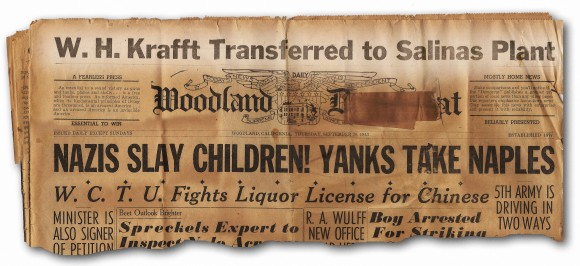 Dad was 9 years old when Pearl Harbor jolted America into World War II. His father, Grandpa Krafft, was so dedicated to service that even tried to reenlist in the military – even though he was already into his 50s by the time.
Dad was 9 years old when Pearl Harbor jolted America into World War II. His father, Grandpa Krafft, was so dedicated to service that even tried to reenlist in the military – even though he was already into his 50s by the time.
Although dad was too young to serve in that war, and his father too old, they did their part back home to support the war. Dad read all the news in the papers, tracked the military campaigns and troop movements on his own collection of world maps, and helped to collect metal, cloth and other materials that all went to the war effort. Dad could also identify every type of military vehicle and piece of equipment, whether German, Japanese, British or American – but he loved our aircraft most of all. From bombers and fighters to transport or reconnaissance, dad could tell you every specification from paint to pistons. Grandpa (William Henry) Krafft, meanwhile, had received another promotion from the Spreckels Sugar Company where he worked, which allowed him to move the family from Woodland back to Salinas where dad spent the remainder of his childhood and teenage years.
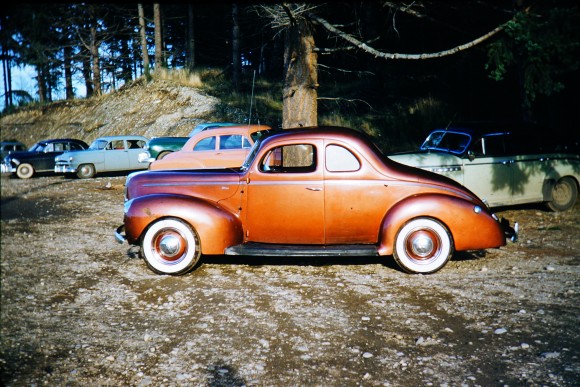 As WWII came to a close, dad was growing up, and his passion for loud engines and fast things only increased. He did a lot of mechanical work in those years, mostly modifying and racing cars with his friends.
As WWII came to a close, dad was growing up, and his passion for loud engines and fast things only increased. He did a lot of mechanical work in those years, mostly modifying and racing cars with his friends.
After high school, Dad attended California Polytechnic State University at San Luis Obispo. It was normal at that time for many students from neighboring areas to fly their crop dusters to school every day. Many of dad’s friends would land their planes in the fields behind campus in the morning, and then fly back to their farms at night. It had only been in recent decades that higher education had become more accessible to more Americans, thanks to the expansion of public education and the GI Bill. Young adults and veterans from around the nation took great pride in the opportunity to experience a good liberal education.
In 1952, Dad had his Associates degree and could have likely qualified for a college deferment to avoid the Korean War, but he chose to serve. He left San Luis Obispo and joined the Army – and his enlistment papers were actually signed and submitted by his own father who ran the local military recruiting office.
During basic training, dad discovered his military talents. He had an innate sense of direction which helped him navigate around foxholes and tank traps in the dark. And his marksmanship was superior as well. At target practice, while one group of soldiers took their turns shooting, others would sit in trenches just below the targets. It was their job to get the targets ready for each round of shooting, and during each cease-fire they would use long sticks to reach up over their heads, and affix small pieces of tapes to cover up the previous set of bullet holes in the targets. Well, dad seemed to enjoy shooting those tiny pieces of tape off of those sticks as they came into sight, much to the annoyance of the soldiers just below his target.
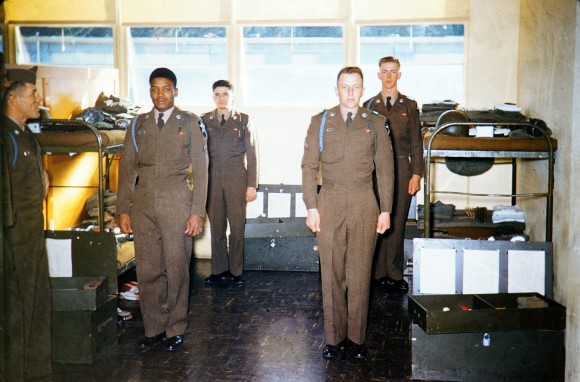 You’ll find the word “integrity” used often to describe dad. One of the stories he told which had the greatest impression on me was of his first days in the Army, going through basic training at Fort Benning, Georgia. One evening, dad and some of his friends called a cab to take them into town. They planned to go to a local night club where dad and his friends could enjoy the jazz and blues they all loved. When the cab arrived to pick them up, the driver looked at dad’s friends, fellow enlisted men serving this great nation of ours, and the driver said “I’ll take you, but not them.” Dad’s friends were black. Having come from California, the south’s segregation was an unfamiliar thing to dad – but he knew bigotry when he saw it. He told the cabby to take a flying leap, and then called one of the “black” cabs to ferry him and his friends to that jazz club.
You’ll find the word “integrity” used often to describe dad. One of the stories he told which had the greatest impression on me was of his first days in the Army, going through basic training at Fort Benning, Georgia. One evening, dad and some of his friends called a cab to take them into town. They planned to go to a local night club where dad and his friends could enjoy the jazz and blues they all loved. When the cab arrived to pick them up, the driver looked at dad’s friends, fellow enlisted men serving this great nation of ours, and the driver said “I’ll take you, but not them.” Dad’s friends were black. Having come from California, the south’s segregation was an unfamiliar thing to dad – but he knew bigotry when he saw it. He told the cabby to take a flying leap, and then called one of the “black” cabs to ferry him and his friends to that jazz club.
Dad also had one of the fastest hot-rods around at that time, and he had it with him during basic training. One night, he went drag-racing, beat the fastest car from California, and got arrested. He called his cousin Tom from jail to figure out how he could post bail. Dad said “if you call my house, be sure and only talk to (his) dad. He’ll help – but be sure and don’t let mom know I got in trouble!” His cousin and other enlisted boys all managed to scrape together enough money to get dad out of jail before he was declared AWOL from bootcamp. But the Army still impounded his car. Not only did they lock it away in storage, but they took the tires off and put them somewhere else – just to be sure dad and his friends couldn’t sneak it out at night.
These stories highlight some of dad’s biggest influences on me: You stand up for the little guy. Serve something greater than yourself. Don’t take yourself too seriously though. And, sometimes it’s ok to break the rules.
Dad was shipped off to Korea, and as they sat on their transport ship in the harbor awaiting their deployment orders, the Korean ceasefire and armistice were declared – ending the war. I might not be here today if the armistice had been declared a few days later, but I’m proud to say dad was prepared to serve and sacrifice everything for his country. Dad descends from a long line of family who have dedicated themselves to the service of our nation, with at least one family member from every generation since the 1600’s having served in every war and conflict in our American (and even pre-American) history.
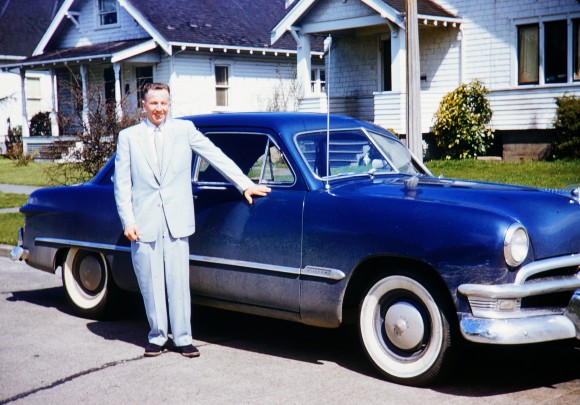 Dad remained in the Army to complete his service, and then returned to Northern California to pick up civilian life again. Dad had grown so much during his time in the military – both literally and figuratively. He was a late bloomer who left to join the Army as a young boy, short in stature with a baby face – but he returned as a grown man, much taller than before, with strong shoulders and new muscles. The Army helped dad to gain a new maturity, physical presence, self confidence, and an even stronger sense of service, integrity and dedication.
Dad remained in the Army to complete his service, and then returned to Northern California to pick up civilian life again. Dad had grown so much during his time in the military – both literally and figuratively. He was a late bloomer who left to join the Army as a young boy, short in stature with a baby face – but he returned as a grown man, much taller than before, with strong shoulders and new muscles. The Army helped dad to gain a new maturity, physical presence, self confidence, and an even stronger sense of service, integrity and dedication.
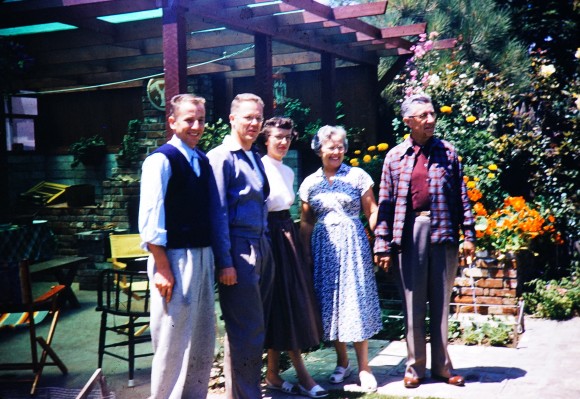 Back in the civilian world, dad still enjoyed working on cars, but he was tired of scrubbing grease out from under his fingernails every night. Dad set his sights on finding a more long-term and rewarding career.
Back in the civilian world, dad still enjoyed working on cars, but he was tired of scrubbing grease out from under his fingernails every night. Dad set his sights on finding a more long-term and rewarding career.
His mechanical abilities helped him take over the service and sales for a local Ford dealership, and then later to handle service and sales with a company that sold the latest business machines, including desk-sized mechanical calculators, to corporate customers.
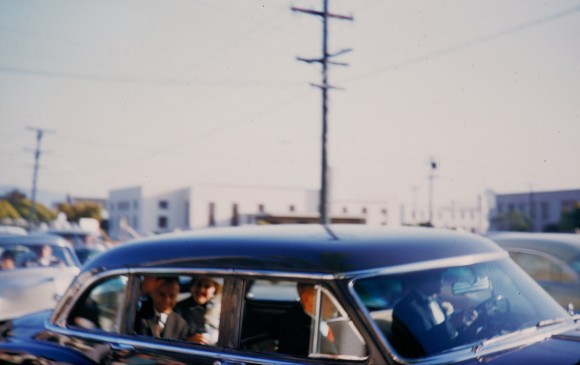 During this time, dad met and married his first wife. She came from a wealthy family who never accepted dad because of his more humble background. Eventually, her family’s disapproval and control broke the marriage apart. Dad was so angry at the arrogance of her family, to judge and disrespect him for nothing more than the fact that he hadn’t been born into a wealthy family. It seemed ridiculous to be looked down upon simply by chance of birth. It was at that point that dad decided to show them that anyone can be rich, to prove that hard work can achieve wealth in a much more meaningful way than having simply been born on the “right” side of the railroad tracks. Ironically, dad’s strong negative reaction to this event would ultimately spur the most positive changes in his life and career.
During this time, dad met and married his first wife. She came from a wealthy family who never accepted dad because of his more humble background. Eventually, her family’s disapproval and control broke the marriage apart. Dad was so angry at the arrogance of her family, to judge and disrespect him for nothing more than the fact that he hadn’t been born into a wealthy family. It seemed ridiculous to be looked down upon simply by chance of birth. It was at that point that dad decided to show them that anyone can be rich, to prove that hard work can achieve wealth in a much more meaningful way than having simply been born on the “right” side of the railroad tracks. Ironically, dad’s strong negative reaction to this event would ultimately spur the most positive changes in his life and career.
Dad focused everything on his new sales job, and quickly discovered sales was his life’s calling.
Dad became a professional sales person, and someone who devoted himself fully to learning his craft. Sales doesn’t just come naturally. Sales, he said, takes skill. Most sales people simply sit around waiting to take orders. Real sales people go out and find businesses, and generate revenues where none existed before. That’s exactly what he did.
Dad worked tirelessly to be the best in his field, still driven by the promise he made himself following his previous marriage. He spent years focused on that goal. And then one day, he found himself standing in the living room of his high-end executive apartment with neighbors that included Hollywood movie stars, CEOs and other local big-wigs, listening to music on his stereo console which was one of the most expensive sets you could buy at that time, drinking the best scotch from a liquor cabinet filled with everything anyone could desire, another new car in the garage, and plenty of money in the bank.
He had made it.
He achieved his goal. Of course he wasn’t “Kennedy” rich, and there would be years in the future that would involve some financial struggles, but at least he proved anyone could achieve wealth even if you weren’t born into it. All it takes is hard work.
But almost as quickly as he realized this, he also discovered that his success didn’t really mean anything. He had spent the past several years building a life of luxury which was completely empty, void of anything truly important. He was alone. We don’t even have any photos of his life from those years.
Dad remained in sales, and was now working for SCM (Smith-Corona-Marchant) where he worked hard to carve out territories and sales prospects.
After breaking state and national sales records for the company, dad found himself limited only by the size of territory his manager felt like assigning him. On more than one occasion, dad’s managers would actually take away the territories he built and give him ones that were much smaller or had virtually zero sales. Back then, many sales managers didn’t believe their sales guys should be making more money than them. But dad of course would take these empty territories and quickly turn them into the top revenue generators for the company, every time.
More than anything else, aside from dad’s dedication to being the best sales person he could, his success was boosted even more by his high ethical standards. Sales people have always been considered the scourge of the earth – dirty, lying, cheating scoundrels. But dad’s customers trusted him completely, because he was clearly always thinking of how to help them – selling them only what they need, but also always thinking of something he could do to help them save money or improve efficiency. Dad didn’t believe in just selling stuff to make money, he believed in helping customers first. Do a job well, and the money will naturally follow.
But he was still alone. And then one day, he walked into an office somewhere to see what he could sell, and he met the person who would eventually change all of that, Ms. Maudie Sue Phillips.
Now, at this point, you have to really understand dad’s family. Dad was raised in a conservative, strict, protestant family where everything was very proper, organized, and orderly. The family was small, just three kids. If it weren’t for the fact that dad himself was actually an unexpected little surprise, the Kraffts would have only had two children. Life in the Krafft household was orderly, not messy, there were no surprises, and everything had a place. There was structure and discipline and order, and nothing happened without a specific plan and preparation. The elder Kraffts were very much influenced by the early 20th century notions of the typical “nuclear family,” along with the parenting skills his mom had to develop as a teenager, when it became her sole responsibility to care for her siblings that had survived the influenza of 1914.
Well, Mom’s family was different than dad’s. She was one of seven brothers and sisters who had all, at some point, shared the same bathroom – often at the same time. There were dozens of cousins, and probably a million extended relatives, or so it seemed. Christmas and holidays, or pretty much any normal day around the Phillips’ household was probably a hundred times more crazy, chaotic, noisy and unstructured than anything dad had experienced in his life to that point. Mom had also freed herself from a bad marriage some years before, and was a single mom with two children – at a time when society was generally all too eager to judge her, rather than praise her for the strength it took to take control of her own life. But mom has the same character and inner strength as dad. Even though the church she wanted to attend wouldn’t allow her to participate in the communion, because of her divorce, she nonetheless insisted on making sure Mike and Philip could be raised up with a spiritual foundation.
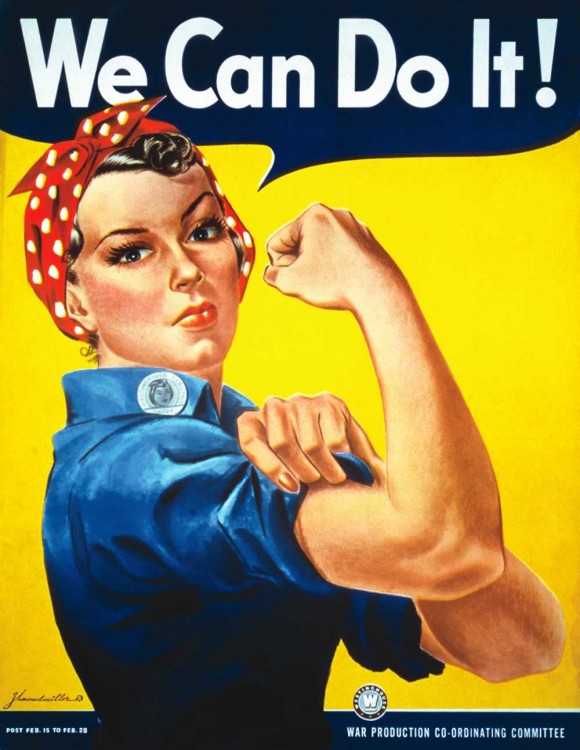 Mom’s strength came from her family – a family that had struggled through the Great Depression, lost everything in the Dust Bowl, moving from Oklahoma to Arkansas where mom was born, and then moving again to California. Mom’s dad worked in the coal mines and metal shops, and her mom was a secretary and phone operator who also built ships for the Navy during the war, just like “Rosy the Riveter” in those old famous posters you’ve seen before. Mom came from a long line of strong and independent women who often changed their fate by sheer will and strength of character. It took a lot to survive those days, the crushing poverty of the Depression, moving across the country in search of work, with her father often separated from the family and going on ahead to establish his job before sending for the family to join him. Life in the Phillips’ family was difficult, but built in them all the strength and character that millions of families would use to escape the Depression and ultimately build America into the leader of the industrialized world.
Mom’s strength came from her family – a family that had struggled through the Great Depression, lost everything in the Dust Bowl, moving from Oklahoma to Arkansas where mom was born, and then moving again to California. Mom’s dad worked in the coal mines and metal shops, and her mom was a secretary and phone operator who also built ships for the Navy during the war, just like “Rosy the Riveter” in those old famous posters you’ve seen before. Mom came from a long line of strong and independent women who often changed their fate by sheer will and strength of character. It took a lot to survive those days, the crushing poverty of the Depression, moving across the country in search of work, with her father often separated from the family and going on ahead to establish his job before sending for the family to join him. Life in the Phillips’ family was difficult, but built in them all the strength and character that millions of families would use to escape the Depression and ultimately build America into the leader of the industrialized world.
So, in spite of their different family styles, these two people, mom and dad, both shared an inner strength and drive to achieve what they desired, rather than what everyone else expected. They were both grounded in their sense of purpose, community and service. They both loved to laugh and live life. And somehow they both had found each other, bright beacons to each other shining through the obstacles they had to overcome.
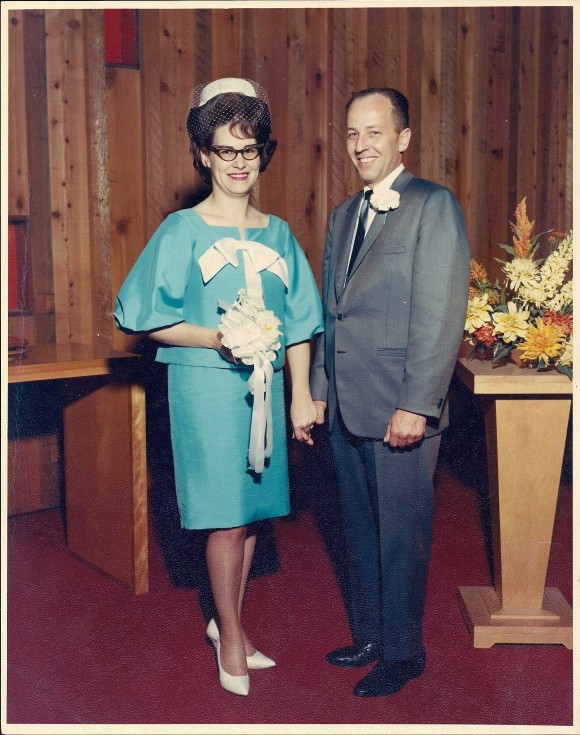 And so mom and dad began their life together. I was born almost a year later, and we lived in Foster City until I was about two years old.
And so mom and dad began their life together. I was born almost a year later, and we lived in Foster City until I was about two years old.
Dad was still doing well at SCM, but management had decided to assign him to literally the worst territory in the nation, and told him he would have to turn it around in less than 6 months, or else. In less than 4 months, dad took the Stockton territory from last place to first in the nation for sales, and was “rewarded” with a transfer to head sales in Southern California.
After the move to Covina, California however, dad quickly became frustrated with the company and their lack of desire or ability to give him what he needed in order to sell their products. He just had a feeling something was wrong in the company, and so Dad decided to resign. Six months later the entire business products division shut down.
It was at this point that dad decided to go into real estate, where success seemed limited only by how far his feet could take him, door to door, on any given day.
But it wouldn’t be easy, starting new careers, with a new family, and moving to southern California and leaving everything else behind. Dad insisted mom be his equal partner in life, taught her everything he knew about sales, and put her name on the mortgage for their new house – at a time when women weren’t allowed to own property alone.
When they moved into the new house in Covina, they were met by many new neighbors – with some mixed experiences. Some would be good friends. Others would be nosy and judgmental. Remember, at that time, even in the 1970s, if you saw older kids with a newlywed couple (my brothers were probably 10 and 12 by that time), the assumption was either that they were the product of a broken marriage, or they had been born out of wedlock. When encountering these types of people, dad always made sure to tell them the latter story – just to rile their delicate moral sensibilities. “Yes, I married Sue just a few years ago, and yes, our older boys are 10 and 12. We were living in sin for a long time.”
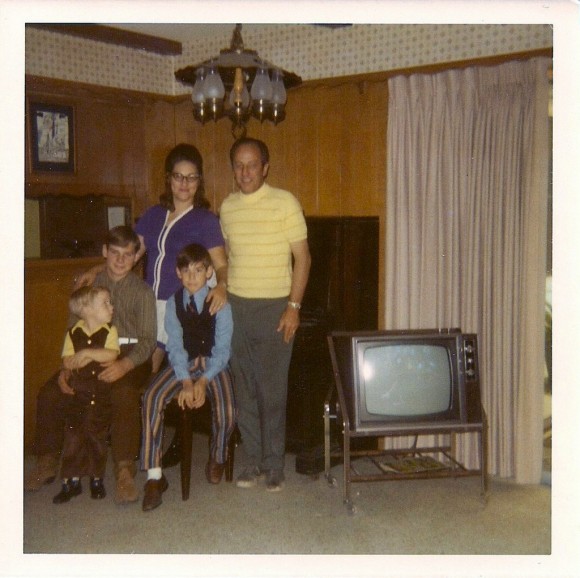 The first few years here were difficult. It took time to build business and prospects. In the meantime, while money was tight, dad and mom did the best they could to raise the family and take care of our needs. We ate government peanut butter and jelly, bought bread in bulk and used it to make dozens of sandwiches which would be kept in the freezer until needed. For the longest time, the sandwiches I took to school were usually half-thawed soggy doughy bread paste by the time lunch rolled around. But we didn’t care. We were taught at a very early age to appreciate whatever we had, rather than complain about what we didn’t.
The first few years here were difficult. It took time to build business and prospects. In the meantime, while money was tight, dad and mom did the best they could to raise the family and take care of our needs. We ate government peanut butter and jelly, bought bread in bulk and used it to make dozens of sandwiches which would be kept in the freezer until needed. For the longest time, the sandwiches I took to school were usually half-thawed soggy doughy bread paste by the time lunch rolled around. But we didn’t care. We were taught at a very early age to appreciate whatever we had, rather than complain about what we didn’t.
Dad recalled how the bills would change colors, depending on how past due they were. They paid the red ones first. Yellow could wait a while. White bills could be ignored. But they also discovered if you let a bill go unpaid too long, bill collectors would actually come to the door. Dad called them the men with the black cigars. Fortunately there was no debtors prison in America back then, so mom and dad could simply put off all the bill collectors until there was money to pay them.
Rather than let themselves be overwhelmed by their financial challenges, the struggle itself seemed to empower and encourage them even more. Mom and dad went to work before sunrise and often didn’t get home until late at night. They worked all day, every day, setting goals for themselves that included not taking a single day’s break until and unless they sold a house. Weeks or even months would go by sometimes, before mom and dad could take a single day off.
Every once in a while, they’d take a little time to relax or entertain themselves. We didn’t have money to go out for movies or fancy dinners. Instead, dad would turn off all the lights in the house, and we’d all lay on the living room floor looking out the open window to the streetlights and stars, while he played his records – ranging from old big band tunes, and his favorite jazz artists, to recordings of steam and coal-powered locomotive trains.
To this day, while most people might be annoyed by the sounds of passing trains, I find them oddly relaxing. And whenever I need to relax or take my mind of things, I often find myself turning off the lights, looking out at the stars and streetlights, listening to whatever sounds or music suits the mood. It’s a surprisingly simply way to find peace during life’s frequent turmoil and challenges.
Grandpa Krafft died suddenly when I was 8 years old. That was the first, and one of only a few times I had seen dad cry. Emotion isn’t an easy thing for someone who had spent most of his life using sheer force of will to determine his own fate. You get so busy just doing things sometimes, it’s easy to forget the importance of connecting with those you love.
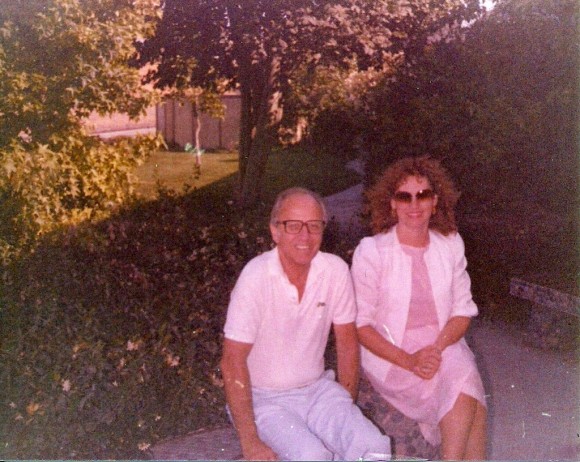 After a few years, hard work began to produce results and rewards. Dad and mom were breaking state and regional sales records, and earning numerous awards from the company where they both worked in Covina. I remember mom getting a “Sales Man of the Year” award in the early 1970’s, years before someone thought to say “Person” instead.
After a few years, hard work began to produce results and rewards. Dad and mom were breaking state and regional sales records, and earning numerous awards from the company where they both worked in Covina. I remember mom getting a “Sales Man of the Year” award in the early 1970’s, years before someone thought to say “Person” instead.
But both mom and dad were still very humble. Mom recalls that whenever anyone asked dad what they did for a living, he’d tell them they just sold used dirt.
My parents decided to open their own real estate office and quickly increased their territory and sales. We moved into a brand new track house in the foothills north of our old city, and the next several years were spent building up their business, rental properties and seeing their family grow now that the oldest boy, Mike, was now married and having kids of his own.
Every once in a while, the economy would recess and real estate was the first thing to be impacted as personal budgets tightened. Some years the money was good, and others would have us back to dealing with those color-coded past due bills. In the early 80s, dad encouraged and supported mom in her desire to become a lawyer. Mom received her law degree the same year I graduated high school, and after passing the Bar exam, her new career helped the family better weather the cyclical nature of real estate.
In the 90’s, Dad’s mom and his sister, Helen, both passed away within just a few years of each other. Dad was fifty-something at the time, but had always looked young – until he lost his mom. I remember how dad suddenly, almost overnight, seemed to look, and act, and even dress old. I think it was during these years that dad first became aware of his own mortality. For several years, it seemed to me that dad had just fallen into an emotional slump, thinking of himself as perhaps too old, or too mortal. I don’t know what happened some years later to shake him out of this, but his slump seemed to end almost as quickly as it began. And suddenly, dad looked young again. He smiled and laughed, and he put all those “grandpa” sweater vests in the back of the closet.
I told dad many times how he actually looked younger at the age of 60, and 70, and even 80, than he did when he was 50 – and it was all simply due to his own mental image of himself. When he was 50, perhaps he suddenly felt life was over. But when he realized he wasn’t going to die from just being 50 years old, he shook himself off and started living again.
For me, the next decades passed so quickly. I was busy with my own life, work and family, but was able to see mom and dad at least a few times per year, and almost every Thanksgiving and Christmas. We’d also come down for the Pageant of the Masters they loved to see every year in Laguna Beach, and you could always count on dad to have the backyard, patio and swimming pool ready and waiting for the family gatherings. I had spent many years growing up in that pool, under the hot southern California sun. And I believe it was there that dad felt truly complete in his life.
Mom’s law practice continued to grow, and dad had no ego nor issue with the fact that her earnings now far eclipsed his own. We joked about it often, and you could see he was so proud of her for having achieved her dreams and become even more of a success in her life than he could have ever imagined.
 Some years later, mom and dad discovered Crestline, a small town up in the San Bernardino mountains, just a short distance below Lake Arrowhead. They bought a cabin near where my brother Phil already lived, and found themselves drawn up into the mountains every weekend. As the years passed, mom and dad gladly eased themselves into working fewer hours, taking more days off, and enjoying life up in the mountain. There were always birds and squirrels to feed, with regular card games, excursions and outings with their new and dearest friends, June and Barrey.
Some years later, mom and dad discovered Crestline, a small town up in the San Bernardino mountains, just a short distance below Lake Arrowhead. They bought a cabin near where my brother Phil already lived, and found themselves drawn up into the mountains every weekend. As the years passed, mom and dad gladly eased themselves into working fewer hours, taking more days off, and enjoying life up in the mountain. There were always birds and squirrels to feed, with regular card games, excursions and outings with their new and dearest friends, June and Barrey.
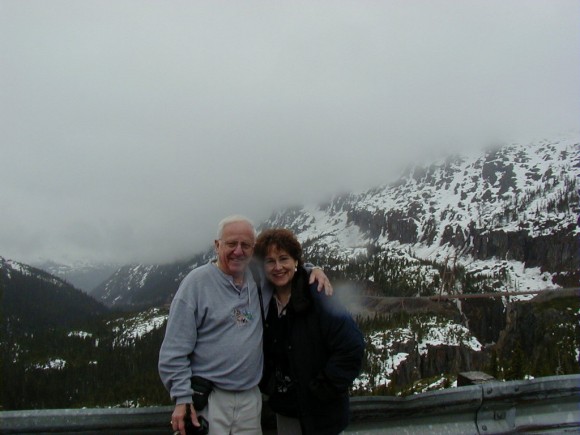 I don’t think even they could have imagined how life’s random twists and turns would have turned out producing such a perfect existence for them. Dad tended to the house in Glendora when he could, while also taking care of the Covina office, and of course the cabin. There was always something to do, but dad enjoyed keeping busy with these things – even though he’d complain about whatever it was he had to fix, then broke, and had to fix again. Dad was like “Tim the Tool Man Tailor” in that old TV show. Sometimes, we kids would have a good laugh at dad’s expense, because of something silly he did while “fixing” something.
I don’t think even they could have imagined how life’s random twists and turns would have turned out producing such a perfect existence for them. Dad tended to the house in Glendora when he could, while also taking care of the Covina office, and of course the cabin. There was always something to do, but dad enjoyed keeping busy with these things – even though he’d complain about whatever it was he had to fix, then broke, and had to fix again. Dad was like “Tim the Tool Man Tailor” in that old TV show. Sometimes, we kids would have a good laugh at dad’s expense, because of something silly he did while “fixing” something.
My favorite story is about mixing paint. In the garage at Glendora, dad needed to mix some paint for one of his home projects. But instead of just using a mixing stick to stir the paint by hand, like most people do, dad decided to connect a long mixer attachment to the end of an electric drill, because, you know, why have power tools if you’re not going to use them, right? Well, dad pulled the trigger on the drill, the mixer immediate got hung up on the side of the paint can, and the entire assembly went spinning out of control, splattering almost the entire contents of the paint can all around the garage, and dad, while he stood there in kind of a state of shock for several seconds. Years later, whenever we’d visit the Glendora house, we could still see the massive splatter of white paint all across the garage floor, surrounding what appeared to be a dad-shaped shadow or silhouette in the middle of the entire mess – a testament to the funny things we loved about dad, etched forever in history.
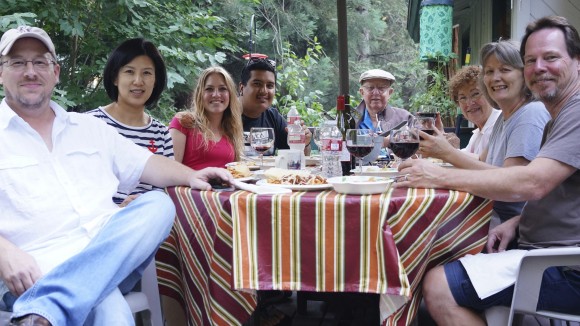 We went to the cabin to visit dad and mom this Fourth of July holiday. Just a few days before our visit, dad’s cancer had taken a more serious turn. For more than a year prior to this, doctors had kept his illness in check, thanks both to the care and skill of his doctors and to dad’s own force of will. We were able to spend our last week together, and many other friends and family also visited during this time.
We went to the cabin to visit dad and mom this Fourth of July holiday. Just a few days before our visit, dad’s cancer had taken a more serious turn. For more than a year prior to this, doctors had kept his illness in check, thanks both to the care and skill of his doctors and to dad’s own force of will. We were able to spend our last week together, and many other friends and family also visited during this time.
Our family has a tendency to try and see the positive aspects in the passing of any relatives, talking about the good memories, sharing laughter and cheers to the people we knew. In some sense, in the last week of his life, dad was able to be present for his own wake, to participate and laugh along with the friends and family who came by to see him.
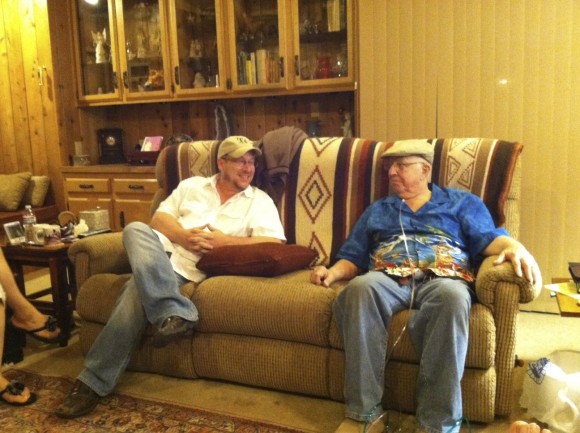 We left to return home that Monday morning, July 8. I called that evening to tell dad we made it back safe and sound, and to tell him how much we enjoyed our visit and seeing him. We exchanged a few more good words and expressions of love. The following morning, he was gone.
We left to return home that Monday morning, July 8. I called that evening to tell dad we made it back safe and sound, and to tell him how much we enjoyed our visit and seeing him. We exchanged a few more good words and expressions of love. The following morning, he was gone.
I think dad left this world the same way he had lived his life. I think he decided it was time to do something different, to go on to whatever comes next – and that’s exactly what he did. And he did so knowing he had done his best to leave us all with good memories of the great man he was.
Integrity, strength, an unstoppable force of will, enjoying love and laughter, an ability to fix anything – even if he was the one who broke it in the first place, someone who took great pride in his work but never expected praise or recognition for his achievements, the strongest sense of service and dedication, and someone who would just tell you what he thought, always.
Dad was simply himself – which is hard to do in this world. To me, my brothers, mom, and all his friends and family, dad’s ability to just be who he was, imperfections, warts and all, made him one of the most interesting and inspirational people any of us have ever known.
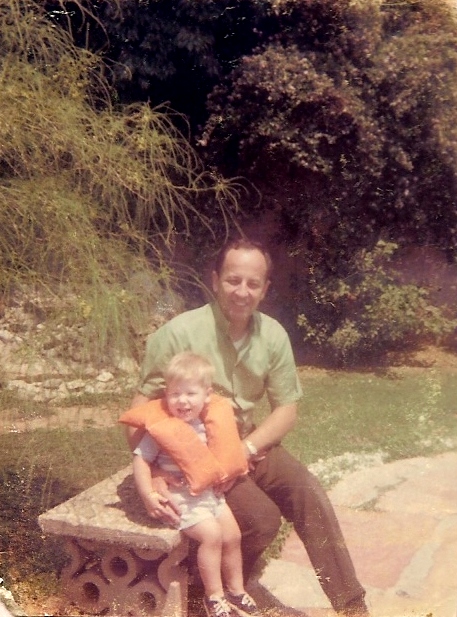 I am my father’s son. I am stronger because of his strength, wiser from his wisdom, more humble from his humility, I try to live with honor and integrity as he had always done, to serve and give charity, and to persevere through all of life’s challenges while taking the time to love and laugh and enjoy the little things all around me – all because of him.
I am my father’s son. I am stronger because of his strength, wiser from his wisdom, more humble from his humility, I try to live with honor and integrity as he had always done, to serve and give charity, and to persevere through all of life’s challenges while taking the time to love and laugh and enjoy the little things all around me – all because of him.
Oh, and don’t trust anyone who doesn’t have a sense of humor. There’s just something wrong with those people. 🙂
And so today we must say goodbye to Thomas Henry Krafft, but we will carry his memory and spirit with us always. Every one of us should be so fortunate to live as he did – honestly and as ourselves. Nothing more, and nothing less.
Goodbye dad. I love you.
Thomas Henry Krafft, Sept. 14, 1932 – July 9, 2013.
Click to hear “Goodbye (Passing the Torch)” composed by Thomas William Krafft, for dad.